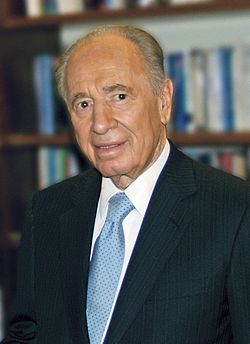Second Peres Cabinet | |
|---|---|
| 26th Cabinet of Israel | |
 | |
| Date formed | 22 November 1995 |
| Date dissolved | 18 June 1996 |
| People and organisations | |
| Head of state | Ezer Weizman |
| Head of government | Shimon Peres |
| Member parties | Labor Meretz Yiud |
| Status in legislature | Coalition government |
| Opposition party | Likud |
| Opposition leader | Benjamin Netanyahu |
| History | |
| Legislature term | 13th Knesset |
| Predecessor | 25th cabinet of Israel |
| Successor | 27th cabinet of Israel |
The twenty-sixth government of Israel was formed by Shimon Peres of the Labor Party on 22 November 1995, following the assassination of Yitzhak Rabin on 4 November. Peres kept the same coalition as previously, namely the Labor Party, Meretz and Yiud, which together held only 58 of the 120 seats in the Knesset. However, the government was also supported, but not joined, by Hadash and the Arab Democratic Party, which held an additional five seats between them. [1]
Contents
Although the Labor Party won the May 1996 Knesset elections, Peres was narrowly defeated by Binyamin Netanyahu in the country's first election for Prime Minister, meaning that the Likud leader formed the twenty-seventh government, which he completed on 18 June.